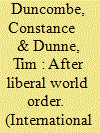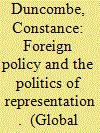|
|
|
Sort Order |
|
|
|
Items / Page
|
|
|
|
|
|
|
| Srl | Item |
| 1 |
ID:
159465


|
|
|
|
|
| Summary/Abstract |
In recent years claims about the end times of the liberal world order have gathered force, with the talk of order giving way to disruption. While there are different accounts of these disruptive dynamics and their causes, it is nevertheless a rare moment in International Relations when all mainstream theories concur that the hegemony of the liberal world order is over and that there is considerable uncertainty about the global architecture that will take its place. Yet claiming that the liberal world order is in trouble is just a starting-point—a deeper account is needed to show how each interrelated element ‘hangs together’. We examine two interrelated patterns to liberal world ordering—internationalism and imperialism. After unpacking each of these interrelated ideas which constitute liberal world order, the narrative will focus on the politics and practice of humanitarianism. Humanitarianism is, of course, deeply intertwined with liberal assumptions about an ethic of care for peoples who are either at risk of, or worse still suffering from, large-scale natural disasters and politically-induced atrocities. Our inference is that the condition of humanitarianism provides a good indication of the state of the liberal world order—its limits and possibilities.
|
|
|
|
|
|
|
|
|
|
|
|
|
|
|
|
| 2 |
ID:
101829


|
|
|
|
|
| Publication |
2011.
|
| Summary/Abstract |
The patterns of representation that position the West as the dominant enlightened Self to the non-West's subordinate Other are evident in Hollywood filmmaking. Films such as A Mighty Heart, The Kingdom and The Siege continue to maintain the Hegelian Master/Slave dialectic of West/non-West, which becomes part of the narrative of the West's identity construction. In delving into this supposed relationship between West and non-West, it appears as though few scholars have considered how the processes of representation feed into this essentialised dialectic. In delving into the area of representation, a space for understanding emerges in relation to determining whether or how much being represented in certain ways affects or acts to manipulate the behaviour and choices of the Other, especially in terms of foreign policy conduct. This article examines representational dynamics in terms of the position of the Other as Self, in order to offer an authoritative conception of how schemas of representation influence the direction of foreign policy.
|
|
|
|
|
|
|
|
|
|
|
|
|
|
|
|
| 3 |
ID:
169949


|
|
|
|
|
| Summary/Abstract |
Social media is becoming a key medium through which we communicate with each other: it is at the center of the very structures of our daily interactions. Yet this infiltration is not unique to interpersonal relations. Political leaders, governments, and states operate within this social media environment, wherein they continually address crises and institute damage control through platforms such as Twitter. A question arises here as to what the turn to Twitter means for conventional structures of power and different levels of communication. This article analyses the emotional dynamics of Twitter, illustrating how emotion is implicated in the power of this social media platform. I argue that Twitter can both represent emotions and provoke emotions, which can play an important role in the escalation or de-escalation of conflict. The emotional conditions Twitter facilitates are implicated in how shifts in temporality and functionality of communication have shaped political discourse so significantly.
|
|
|
|
|
|
|
|
|
|
|
|
|
|
|
|
| 4 |
ID:
172549


|
|
|
|
|
| Summary/Abstract |
Images are central to social media communication. Billions of images are shared across different social media platforms every day: photos, cartoons, GIFs and short video clips are exchanged by users, facilitating or framing discourse on participatory sites such as Twitter, Facebook and Instagram. Many of these images depict events of extreme violence, which circulate uninhibited by the conventional constraints associated with traditional news media censorship. A question arises here as to how such images mobilize public and policy-making responses to atrocities. This article examines the political dynamics of violent social media images. I argue that the particular qualities of social media can play an important role in how the digital visibility of horrific violence influences policy-making as a response to such atrocities. There is an important connection between the properties of social media platforms that allow user images to reach a global audience in real time and the emotional responses that this level of circulation generates. In turn, the pressure created by events made globally visible through the circulation of violent images and the audience responses to those images puts governments in a position where they are forced to act, which has significant implications for policy-making.
|
|
|
|
|
|
|
|
|
|
|
|
|
|
|
|
| 5 |
ID:
153854


|
|
|
|
|
| Summary/Abstract |
Social media is increasingly used as a means of communication between states. Diplomats and political leaders are ever more relying on Twitter in their daily practice to communicate with their counterparts. These exchanges occur in view of a global audience, providing an added level of scrutiny that is unique to this form of communication. Twitter arguably challenges traditional notions of diplomacy according to which it is conducted through formal channels of communication and informal face-to-face social engagement. Yet we must ask how instrumental social media is as a tool for signalling intentions, and whether this medium can be an effective platform for dialogue and trust development when traditional face-to-face diplomacy is limited. Social media posts by state representatives reflect and frame state identity and how a state wishes to be recognized by others. If we are attuned to these dynamics, shifts in representational patterns communicated through social media during high-level negotiations allow realizations of political possibilities for change. Key here is the surprising nuclear deal between Iran and the P5+1 that analysts and policy-makers have struggled to explain. I argue that the role of Twitter as a key part of negotiation strategy is a crucial demonstration of how social media can shape the struggle for recognition, and thereby legitimize political possibilities for change. Understanding the increasingly prominent and powerful, yet largely unknown, variable of social media as a tool of diplomatic practice provides insight into the recurrent question of how diplomats affect change beyond upholding the status quo in the international order.
|
|
|
|
|
|
|
|
|
|
|
|
|
|
|
|
|
|
|
|
|